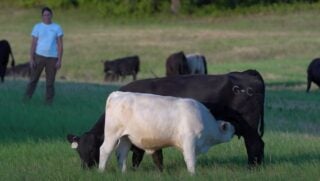University of Cincinnati biologists discover the parasite’s metabolism speeds up after months of fasting so it can pursue a meal.
Just about every farmer, rancher, and hunter has picked a tick off of themselves before. For many of us, it happens multiple times a week during the summer months. These despicable little parasites are great at spreading disease and leaving us with itchy red spots at the bite spot — it pretty much makes them universally hated.
Now we learn that after ticks miss a few meals — they’re hardy little brutes that can go as long as a year without a meal — they work all that much harder to find you and other hosts.
The findings could have implications for the spread of tick-borne disease such as Lyme or Rocky Mountain Spotted Fever.
“Starved ticks are more likely to look for a host,” said Andrew Rosendale, lead author of the study and a University of Cincinnati adjunct assistant professor of biology. “Other studies have found that starved ticks take larger blood meals. They’re attached to the host longer, which provides a greater opportunity to transmit diseases.”
The study was published in the journal Molecular Ecology.
Ticks drink blood as larvae, nymphs and adults but spend most of their lives on the ground in tall grass, patiently biding their time for a victim and presumably ignoring their rumbling stomachs.
Finding a suitable animal upon which to feed is hard, so ticks must be prepared to wait. And wait. Rosendale said being able to go long periods without a meal is a tick’s superpower.
Biologists in UC’s McMicken College of Arts and Sciences studied the changing gene expression and physiology of lab-raised dog ticks that were subjected to more than 36 weeks of starvation.
Studies have found that starving animals often take bigger risks, such as hunting more dangerous prey or exposing themselves to predators to forage for food. UC’s research suggests ticks are no exception.
The research
In the wild, adult ticks explore the undergrowth and climb tall grass. They reach out with the claws on their forelegs, a behavior called questing, to snag an animal’s fur or your denim jeans. Then they burrow into their hosts with mouthparts shaped like ratchets that keep them in place.
In the lab, UC researchers stimulated the ticks’ questing behavior by breathing into identical glass cylinders. (Ticks can sense carbon dioxide so they know when a possible meal is close at hand.) Biologists recorded differences in activity between just-fed ticks and starving ones. They found that starved ticks had higher activity levels and increased questing behavior than recently fed ones.
Starved ticks also had marked changes in their physiology and gene expression.
Ticks can go so long between meals because of their slow metabolism.
“In the absence of any host cues, they go into a dormant state where they don’t move around a lot,” UC biology professor Joshua Benoit said.
This helps conserve energy for the ticks’ preferred wait-and-see ambush strategy.
But after three months without food, a tick’s metabolism actually increases significantly — by as much as 100 percent — and remains at this higher rate for weeks in association with its increased activity. In fact, some researchers collect ticks in the wild by placing dry ice in the woods to entice them with the sublimation of carbon dioxide.
Likewise, UC biologists found that genes related to immunity were activated by starvation, which could be another survival mechanism. Animals that feed on blood must have a immune system capable of fighting bacteria and other microorganisms. By activating genes associated with immunity, ticks might be preparing for an imminent meal.
More strangely, UC biologists found that genes associated with a starved tick’s salivary glands were activated. Saliva is known to help ticks drink more blood more quickly, a useful ability when you’re clinging precariously to a moving animal in thick brush. The sticky saliva also helps cement the tick to the host.
“The more they were starved, the more they were priming themselves for that next blood meal,” Rosendale said.
The study was funded by the U.S. Department of Agriculture, UC’s Faculty Development Research Grant and the National Science Foundation. UC graduate Megan Dunlevy and Marshall McCue of the metabolic measurement firm Sable Systems International contributed to the study.


